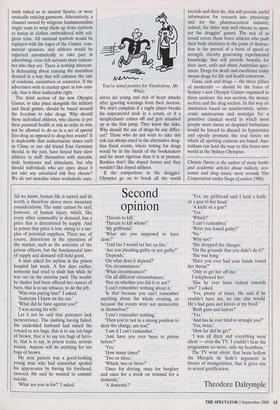Second opinion
AS we know, human life is sacred and its worth is therefore above mere monetary considerations. The same cannot be said, however, of human injury, which, like every other commodity in demand, has a price that is determined by supply. And in prison that price is low, owing to a sur- plus of potential suppliers. There are, of course, distortions in the operation of the market, such as the activities of the prison officers, but the fundamental laws of supply and demand still hold good.
A man asked for asylum in the prison hospital last week. A few days earlier, someone had tried to slash him while he was out on the exercise yard. The would- be slasher had been offered two ounces of burn, that is to say tobacco, to do the job.
`Who was paying him?' I asked.
`Someone I knew on the out.'
`What did he have against you?'
`I was seeing his wife.'
Let it not be said that prisoners lack perseverance. The slashing having failed, the cuckolded husband had raised the reward to ten bags, that is to say ten bags of brown, that is to say ten bags of hero- in, that is to say, in prison terms, serious money. Anyone will do anything for ten bags of brown.
My next patient was a good-looking young man who had somewhat spoiled his appearance by having his forehead, tatooed. He said he wanted to commit suicide.
`What are you in for?' I asked. `Threats to kill.'
`Threats to kill whom?'
`My girlfriend.'
`What are you supposed to have done?'
`Told her I would set her on fire.'
`Are you pleading guilty or not guilty?'
`Depends.'
`On what does it depend?'
`On circumstances.'
`What circunistances?'
`On all different circumstances.'
`Not on whether you did it or not?'
`I can't remember nothing about it.'
`Is that because you can't remember anything about the whole evening, or because the events were not memorable in themselves?'
`I can't remember nothing.'
`Then you're not in a strong position to deny the charge, are you?'
`I am if I can't remember.'
`And have you ever been to prison before?'
`Yes.'
`How many times?'
`Two or three.'
`Which, two or three?'
`Once for driving, once for burglary and once for a week on remand for a domestic.'
`A domestic?' `Yes, my girlfriend said I held a knife or a gun to her head.'
`A knife or a gun?'
`Yes.'
`Which?'
`I can't remember.'
`Were you found guilty?'
`Why not?'
`She dropped the charges.'
`On the grounds that you didn't do it?' `She was lying.'
`Have you ever had your hands round her throat?'
`Only to get her off me.'
I telephoned her.
`Has he ever been violent towards you?' I asked.
`Yes, plenty of times. He said if he couldn't have me, no one else would. He's had guns and knives at my head.'
`Both guns and knives?'
`Yes.'
`And has he ever tried to strangle you?' `Yes, twice.'
`How far did he get?'
`I was all dizzy and everything went silent — even the TV. I couldn't hear the programme no more, only my heartbeat.'
The TV went silent: that beats hollow the Marquis de Sade's argument in favour of strangulation, that it gives rise to sexual gratification.
Theodore Dalrymple


























































 Previous page
Previous page